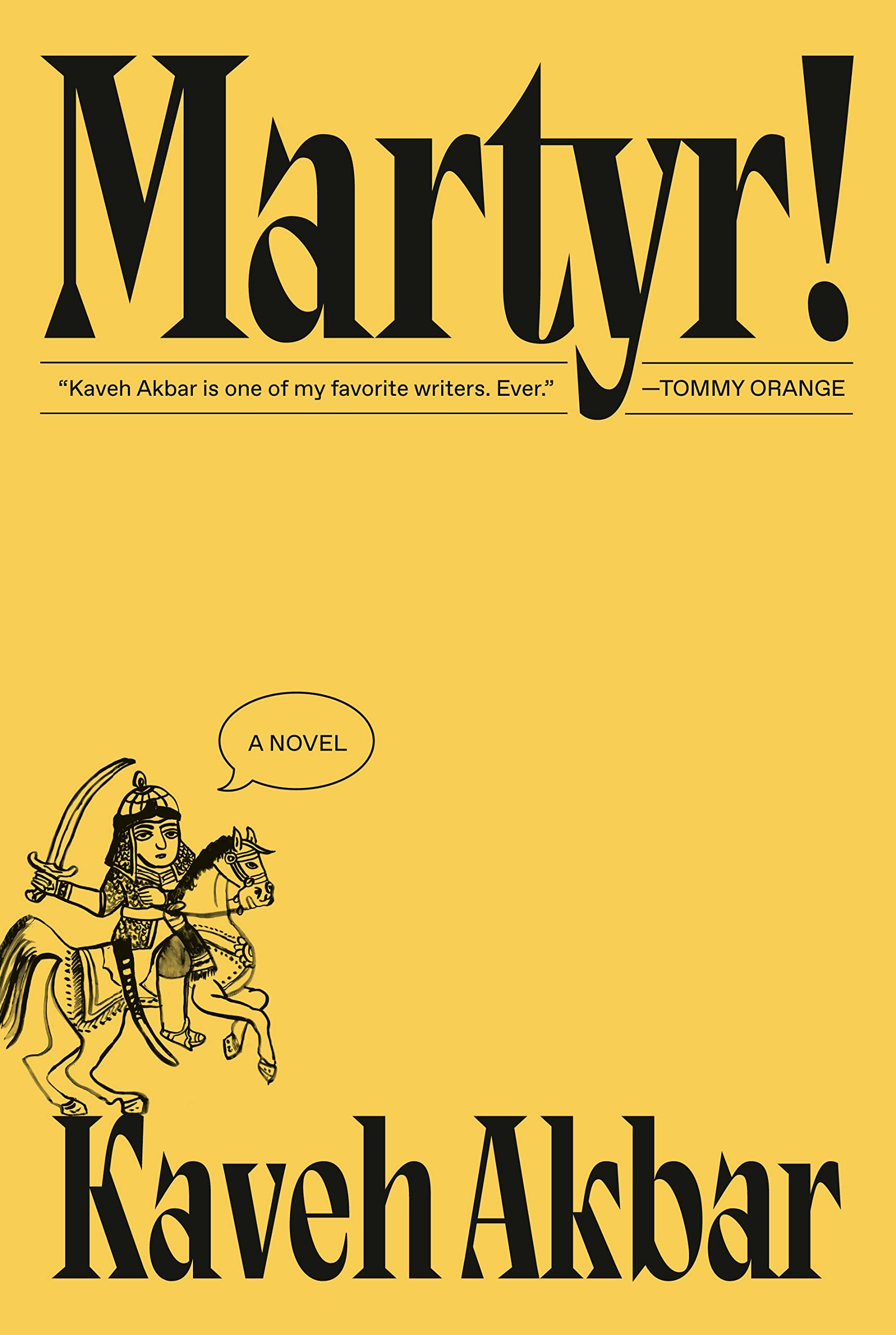Martyr! by Kaveh Akbar
Review of Martyr! by Kaveh Akbar
Martyr! by Kaveh Akbar (2024). Published by Knopf.
As an Iranian American poet who has been active in the literary scene and considering emerging, it has been my mission in the past few years to try and read as much literature as I can from fellow AAPI authors.
I always knew of Kaveh’s work from the beginning of my time as a poet, as I began writing in high school, all the way back in 2014.
I’m pretty young in industry when typing this, but Kaveh was one of the few Iranian American writers, like Solmaz Sharif, that worked within poetry that I could look up to. I took a workshop with him once even, and it was such a lovely experience.
While I am a part of a different generation of Iranian Americans, it was so nice having these kinds of role models because it was rare otherwise. We don’t get a ton of representation in American media and literature.
So when I found out Kaveh was having a novel published, I knew I was going to have to read it immediately. Because I was broke from paying tuition from grad school, I placed a hold as soon as my library had the book available to request, and found myself the fortieth person in line for Martyr!; it came after a month of being in line.
I devoured the book within a day, as I really needed a distraction from my master’s thesis at that time. This book was perfect for the moment I read it within.
I’m rambling enough already—let’s get into the review!
Cyrus grapples with the trauma of his parents’ deaths as he tries to become a writer.
Our main character in this novel is Cyrus, who is in his twenties and was an alcoholic before he decided to sober up. He pursued his writing degrees in Indiana, which is interesting to me because Kaveh himself was an alcoholic (read his collection Calling a Wolf a Wolf, which is about that), and taught in Indiana at Purdue University for a while.
Anyways, Cyrus had a major trauma early on in life: his mother, Roya, was on the Iranian flight that was downed by the Americans in the late eighties. It was not long after his birth, leaving him a motherless child, and his father decided to leave Iran after that and move to the Midwest of the United States.
There, his father worked as a laborer with many other immigrants, and passed away not long after Cyrus came of age. Alone in the world, Cyrus is now writing poems for a living, struggling with his past and sobriety, and is trying to confront the truth of his situation.
There’s also the fact he is Iranian American, which adds another layer of complexity to this story. Our history in the United States, especially in recent years, is one full of trauma and sometimes a lack of accepting. Many are severed from the homeland, despite considering themselves solely Iranian.
Things are about to change for him when he sees an advertisement for an art exhibition at the Brooklyn Museum. The artist, who is Iranian American herself, is dying and decided to spend her last days as a part of an exhibit. Similar to the exhibit at the MoMA where people would go up to the artist, who would sit at the middle with a table, she wants to talk to people.
Cyrus is obsessed with death and decides to take the opportunity to talk to this artist. When he heads to NYC, we discover so much more, leading to a very interesting plot twist that could be kind of predictable in some ways.
Throughout all of Cyrus’s story, we switch between narratives. For example, we go into his mother’s head before her death, and discover she had a lesbian relationship despite both women being married. Her getting on that flight was not a coincidence, nor what it seems to be originally.
We also get a bit of mythology between sections, which, if you’re not familiar with Persian myths and history, you’ll still be fine. The Iran-Iraq War is contextualized even here, so you won’t need to be an expert.
Overall Thoughts
While I enjoyed this novel and can see it as very important in the society and publishing industry we live in today, I didn’t love it. I think the representation and whatnot was the key factor in enjoying it, as well as Akbar’s prose.
I think what I would’ve wanted more from this book was to split it and go more into each person’s story. While there is a note of finality at the end, I wanted to see more from Roya’s life. She is so fascinating to me, especially when we start pulling back the veil of who she is.
That said, I’m glad I read the novel. It would’ve been painful to wait longer than I already did to read it, so I got ahold of the book at the right time. I will certainly be reading more of Akbar’s work in the future!
Follow me below on Instagram and Goodreads for more.


![Jeju-do (제주도) is one of those places that reminds you of how stunning the world is
[7.12.2024 부터 7.14.2024 까지]](https://images.squarespace-cdn.com/content/v1/5ea1f794501b7153b29e7cd7/1721033601522-554E76HR01JUHDWZBJ1I/image-asset.jpeg)









